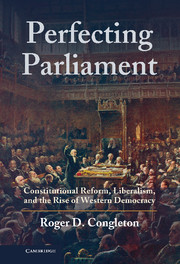Book contents
- Frontmatter
- Contents
- Preface
- 1 On the Origins of Western Democracy
- Part I Sharing Sovereignty
- 2 Team Production, Organization, and Governance
- 3 Organizational Governance in the Long Run
- 4 The Origins of Territorial Governance
- 5 Constitutional Exchange and Divided Governance
- 6 The Power of the Purse and Constitutional Reform
- 7 Suffrage without Democracy
- 8 Ideology, Interest Groups, and Adult Suffrage
- Part II Historical Evidence on Western Democratic Transitions
- Part III Analytical History as Social Science
- Appendix Methodological Approach, Limits, and Extensions
- References
- Index
8 - Ideology, Interest Groups, and Adult Suffrage
Published online by Cambridge University Press: 05 June 2012
- Frontmatter
- Contents
- Preface
- 1 On the Origins of Western Democracy
- Part I Sharing Sovereignty
- 2 Team Production, Organization, and Governance
- 3 Organizational Governance in the Long Run
- 4 The Origins of Territorial Governance
- 5 Constitutional Exchange and Divided Governance
- 6 The Power of the Purse and Constitutional Reform
- 7 Suffrage without Democracy
- 8 Ideology, Interest Groups, and Adult Suffrage
- Part II Historical Evidence on Western Democratic Transitions
- Part III Analytical History as Social Science
- Appendix Methodological Approach, Limits, and Extensions
- References
- Index
Summary
The analysis of the previous two chapters suggests that the rise of parliament and the expansion of suffrage are not necessarily connected with each other. There are many occasions on which parliaments may gain policy-making authority, without producing similar gains to trade between those eligible and not eligible to vote. Chapter Six suggests that changes in the distribution of income, new technologies of production (and destruction), and changes in the person holding the royal office may induce changes in the distribution of policy-making authority between the king and parliament. Chapter Seven suggests that those same changes would not produce a majority in parliament in favor of suffrage reform, because both voters and members of parliaments tend to prefer the existing election laws for pragmatic reasons.
Shifts of authority between a king and council, consequently, are predicted to be more common than changes in suffrage laws. Revolutionary threats and palace coups may also affect the balance of authority between the king and parliament, but are not likely to produce suffrage reform. Fear of revolution is likely to increase executive power, which may be used to discourage participation in politically active interest groups. Moreover, it should also be noted that parliaments may be elected by very broad suffrage without producing democratic rule, if parliament itself has little policy-making authority.
- Type
- Chapter
- Information
- Perfecting ParliamentConstitutional Reform, Liberalism, and the Rise of Western Democracy, pp. 161 - 184Publisher: Cambridge University PressPrint publication year: 2010



